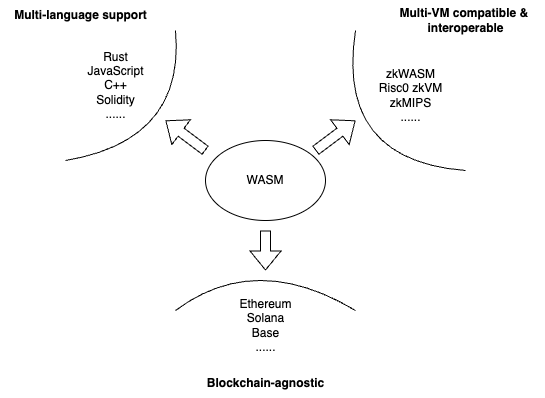Overview
ZKCross provides a solution, with WebAssembly (WASM) at its core, to help build next generation of decentralized applications (dApp).
What is WASM?
WASM is a transformative binary instruction format, designed to serve as a portable compilation target for high-level languages, enabling code to run on the web at near-native speed. It is an open standard that brings significant performance improvements and new capabilities to web applications. WASM has been widely used in distributed cloud and edge computing. Additionally, it has become a favored binary format for running customized functions on platforms like Microsoft, Amazon, Google, Fastly, Cloudflare, and Mozilla.
Here are its key features:
-
Secure: WASM runs in a secure, isolated sandbox environment within the browser, minimizing security risks by preventing direct access to the underlying system.
-
Efficient: WASM modules are optimized for performance, reducing load times and enabling high-performance execution, especially for computationally intensive tasks.
-
Versatile: WASM supports multiple programming languages, including C, C++, Rust, and others, allowing developers to write code in their preferred language and compile it to WASM.
Motivation and Vision
We believe the current challenges in the Web3 industry boil down to the following four factors: high barriers for developers, fragmented ecosystems, poor user experience and lack of trustlessness.
Therefore, we propose an ultimate vision for Layer 2 (L2) dApp chains. There are four essential criteria that must be fulfilled:
- multi-language support
- multi-VM compatible
- blockchain-agnostic
- zk-provable
WASM is the key to achieve this vision. WASM acts as a powerful runtime environment, supporting multiple languages and virtual machines. It can facilitate complex dApps, making blockchains agnostic. Besides, combined with zero-knowledge technology, it empowers dApps with zk-provable capabilities.

Join the community
- Website: https://www.zkcross.org/
- Discord: https://discord.com/invite/aJNjfRvgam
- Twitter: https://twitter.com/thezkcross
- Telegram: https://t.me/ZKCross
- Blog: https://blog.zkcross.org/